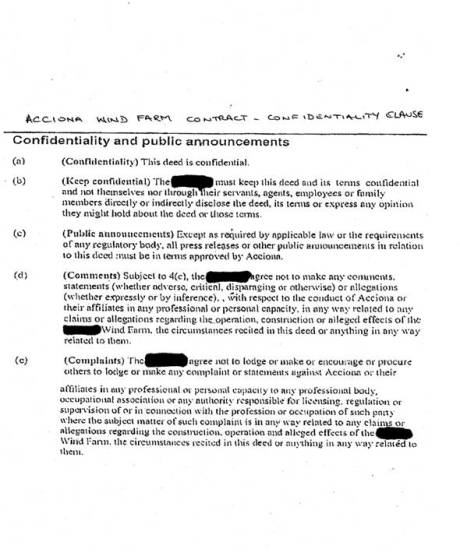Parliamentary staffers in Canberra are investigating whether senior wind farm company executives have lied to two Senate inquiries.
A source told STT Senate staff had received complaints about the testimony given in 2011 and 2012.
 Andrew Thomson of Acciona (left) and Jonathan Upson of Infigen Energy (right) both testified their
Andrew Thomson of Acciona (left) and Jonathan Upson of Infigen Energy (right) both testified their  companies’ turbine host contracts did not include gag clauses.
companies’ turbine host contracts did not include gag clauses.
But copies of the contracts seen by STT revealed clauses designed to silence outspoken landholders.
Liberal Senator Chris Back has also raised the issue in Parliament last October in a speech largely unreported in the mainstream media.
“I can state quite categorically that these contracts do contain confidentiality clauses that would actually penalise a person if they spoke publicly—including if they were suffering health effects,” he said.
But from testimony given by Upson and Thomson at two Senate inquiries, you would never guess this was the case.
Hansard records their comments:
Testimony to the Senate Inquiry hearing, Melbourne, March 28, 2011:
Mr Thomson—Our practice at Acciona is not to put in place so-called ‘gag’ clauses.
Senator BOYCE—Can I just ask that question in a different way? There is comment, I think, in the Pacific Hydro report on the fact that the New Zealand standard that provides protection against sleep disturbance, noise levels and health and amenity is used by a lot of planning panels. Do any of you have contracts that would prevent people from raising issues with planning panels around sleep disturbance, noise levels and health and amenity? Can we have some words?
CHAIR—Shaking heads does not get recorded.
Mr Thomson—No.
Mr Upson—At Infigen Energy, no, we do not.
 At the Senate Inquiry into the Renewable Energy Amendment Bill 2012 last November, Upson again gave testimony.
At the Senate Inquiry into the Renewable Energy Amendment Bill 2012 last November, Upson again gave testimony.
He was asked if he would clarify for the Committee whether it was still his position on behalf of Infigen Energy that no gag clauses were inserted in landholder contracts.
This question was taken on notice and his reply was emailed to the Senate Committee.
His reply was as follows:
“Carol,
I can confirm that my statement during the hearing is correct.
Infigen has no wind farm contracts in place with clauses that would preclude landowners from raising issues about any perceived noise or health issues with planning authorities (or media outlets).
Regards,
Jonathan Upson”
But contracts shown to STT certainly include clauses which restrain turbine hosts from speaking publicly.
Extract from the Infigen contract:
Lake Bonney and Flyers Creek wind farm contracts (both projects are owned by Infigen).
[Clause 4.19 (Lake Bonney) and Clause 4.18 (Flyers Creek)
Confidentiality:
a) The Lessee agrees to keep confidential and not to disclose, divulge or make known at any time to any third  party any information not in the public domain concerning the Lessee or the operation of the Wind Farm or any part of it; and
party any information not in the public domain concerning the Lessee or the operation of the Wind Farm or any part of it; and
b) The Lessor and the Lessee mutually agree not to divulge any information not in the public domain communicated in confidence by the other party to it, save and except where disclosure is required by law.
The following is a copy of an Acciona wind farm contract, confidentiality clause.
 Senator Chris Back has referred to confidentiality clauses in landholder contracts from a range of companies, including Acciona and Infigen.
Senator Chris Back has referred to confidentiality clauses in landholder contracts from a range of companies, including Acciona and Infigen.
Senator Back accused the Clean Energy Council’s Russell Marsh also of lying about confidentiality clauses in turbine host contracts.
“I can state quite categorically that these contracts do contain confidentiality clauses that would actually penalise a person if they spoke publicly—including if they were suffering health effects. This, in my view, directly counters what Mr Marsh asserted in his letter to me.”
Hansard from March 28, 2011, runs to 131 pages of Senate inquiry testimony.
We happily make available a copy for your personal reading pleasure.
But here’s another interaction with Thomson from Acciona.
CHAIR—Do you have a clause about non-disparity comments in there?
Mr Thomson—We have a clause which asks the individual not to provide public commentary on their  experience with Acciona. We would be happy to provide, out of session, that clause so that you can have a look at it.
experience with Acciona. We would be happy to provide, out of session, that clause so that you can have a look at it.
CHAIR—That would be appreciated. Thank you.
Senator MOORE—You would like to keep that confidential?
Mr Thomson—Yes, we require that to be confidential.
Senator MOORE—Absolutely. I just wanted to pick that up.
Mr Thomson—I reiterate that it does not go to issues of health or their experience of the wind farm. The person in question has spoken publicly about their experience of the wind farm and health, and we have not tried to stop that.
CHAIR—That would be appreciated. Thank you.
The person Thomson was referring to was former Waubra resident Trish Godfrey, who was subpoenaed to give evidence in a wind farm court case in South Australia.
STT understands that Acciona did, in fact, try to stop Godfrey from testifying – but failed.
Thomson said there was a clause that “asked” Acciona landholders not to speak publicly about their experiences with Acciona.
“Asked”? How uncharacteristically polite.
But the clause did not specifically preclude them from talking out on issues of health or their experience of the wind farm.
 Thomson said that clause – the confidentiality clause – was confidential. Now, ain’t that cute?
Thomson said that clause – the confidentiality clause – was confidential. Now, ain’t that cute?
But the crux is this.
How can an Acciona landholder speak out about their suffering or any disagreement or complaint about the wind farm they are part of without speaking out directly about Acciona?
Thomson’s testimony was wind energy weasel words. Again.
And in our humble and collective opinion after three … or was it four… very rugged bottles of Jacobs Creek plonk, old Mr Slick’s performance could … would …. most certainly constitutes contempt.
Acciona, after all, has shown nothing but contempt for the residents of Waubra, Gunning and Cathedral Rocks. Why should this occasion be any different?
The Parliamentary Privileges Act 1987 provides that a House of Parliament may impose terms of imprisonment or substantial fines for individuals and corporations as a penalty for contempt.
From the APH website: “To date the Senate has not had occasion to use either of these penalties, preferring an educative and preventative approach. The Senate has accepted apologies and remedial action, and has encouraged government officials in particular to attend training courses on the rights and obligations of witnesses before parliamentary committees.”
That last bit seems a bit fluffy, in our opinion.
We think it’s time to shoot the weasel.


I bet they will not be punished in any way, such is the euphoria of state institutions concerned
What happened to the days of the people running the country; do we really need to be so far up shit creek before we realise that the government and corporate giants are really screwing the pooch on our country. So many things in this country, can be done in a much more efficient and cost effective way. As it is, we don’t own our own utilities anymore, we don’t even own our own land. When it comes to voting, what have we got to choose from, Tony friggen Abbot…the bloke can hardly put a sentence together and has got as much personality as a wet rag. Julia Gillard, well, she has gone back on half of the promises she has ever made. So to put it simply…she’s pretty shit too. Sorry about the the language, but I cannot seem to find another word that describes the situation as well as shit. Personally, I think that a level headed teenager with their morals in the right spot could do a better job then all of our pollies combined. Pretty sad really.
Bikies think they are above the law, and look what happens to them. How come corporate giants don’t get the same treatment?
The wind company people are all rats. They don’t care what they do to the country people they only care about the $$$. Don’t believe anything they tell you. Mausie
fancy linking this cute little animal to the well practiced slimy mouthed, self interested, scheming, devious wind turbine power station employees!
I don`t know if there are any known creatures low enough to be compared to windpushers.
Rather than prison, if proven guilty, could we have these guys locked up under house arrest at a home very close to wind turbines?
Yes George! THAT would be a case of Instant Karma!
I believe we are at the point now, where an entire prison would be warranted. It could easily be filled with the criminals and scammers of the wind industry, along with the politicians complicit in this fiasco. Hundreds of HUGE industrial wind turbines could surround this prison, and we could put it in a nice windy area so that we create a maximum amount of electricity to shock their sorry butts every time they stepped out of line. Finally….a useful purpose for turbines….a method of punishment! (We’d better make sure we have a good gas or coal back-up, that way they won’t get away with murder on the days with no wind.)
Would STT care to confirm that no weasels or other small animals were injured during the preparation of the above post?
That weasel was suffering from wind turbine syndrome. Shut off the turbines, and he will be fine! (just a bit of dizziness) Tongue planted firmly in cheek of course! The weasel really just looked at his electricity bill for this month.
Hold on. The wind industry lie?? That’s not possible!
Especially when they go around saying that “Australia (or fill in your own country) is the only place in the world where people are complaining.”
We KNOW that’s not a lie. *cough* *cough* *gag*
If the person refuses to sign the confidentiality clause, will they still get their settlement, or is the settlement used as a bribe, or to coerce them into signing away their right to disclose the truth to other’s who may be in a similar situation?
Windpusher: Qualifications necessary….the complete lack of morals and integrity necessary to allow you to lie with a straight face, no matter how big, nasty, or harmful that lie may be. Anyone with a conscience, need not apply. (special consideration given to crooked politicians….you just can’t buy training like that!)
Id like to see someone speak out and see what AGL or Acciona do, I suspect both would be to gutless to do anything.
Ive seen the acciona contracts many years ago that were drawn up by Andrew Newbold the Hawthorn football club president when wind power were in existance and they had plenty of gag clauses then. Funny thing it was a landholder at Waubra who I get it from, so there goes the confidentiality clause right there!
These companies wont do anything, you could go throw rocks through their office windows and they would be to spineless to fight back.
They do not want to fight back, because that may draw attention to what is going on and their entire scam could come crashing down.
Mr James Higgins, the General Manager of Slater and Gordon has confirmed the existence of these confidentiality agreements in a letter to the Australian on 4th May, 2012.
In it he stated clearly that these confidentiality clauses were “required by the wind farm operators and are typically required in these types of settlements”. I know that Slater and Gordon acted for some of the residents at Toora who were forced from their homes because of serious health problems. Their homes were subsequently bulldozed, relocated, or just abandoned.
I wonder why these confidentiality clauses are “typically required”?
Perhaps to keep this story of adverse health effects out of the gaze of the public, the media, the aspiring wind turbine hosts, and health practitioners???
The full text of the letter is below:
“James Delingpole asserts that Slater and Gordon have been responsible for “rigorous gagging orders” in favour of wind farm operators. This is wrong. We have acted for landowners who have been affected by the operation of nearby wind farms.
Any confidentiality clauses associated with some compensation claims have not been made at our direction. Such clauses are required by the wind farm operators and are typically required in these types of settlements. It is a decision for our clients as to whether they accept such clauses.”
These companys appear to believe they are above the law. To have these clauses is indication they expect problems, why, because they know they exist. In the end they will have to accept responsibility of causing pain and anguish to people and damage to the environment. Being aware this could happen makes them culpable for the consquences of their actions – and confidentiality clauses will not prevent justice from being served.
Acciona are full of weasel’s that is why they use weasel words.